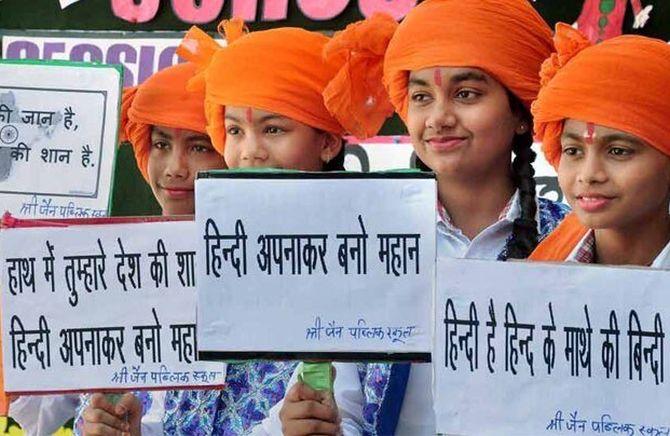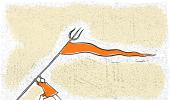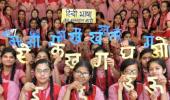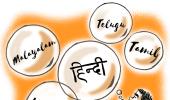It looks like Hindi, which faces political opposition at the front door, is entering Tamil Nadu through the kitchen, says Syed Firdaus Ashraf.

On a visit to Pakistan in 1998, a distant relative asked me: 'Can you read Urdu?'
Every other relative in the room laughed when I said no. One of them asked, 'What is Javed Akhtar doing? Does he devote time any more to teach Urdu to Indian Muslims?'
I had no answer, so I kept mum.
That question about Urdu in India has haunted me since. I discovered later that none of my cousins in India knew to read or write Urdu, and subsequently learnt how Hindi had decimated Urdu in middle class Indian Muslim homes.
I wondered how.
When the 3-language controversy erupted this week, I realised how the proponents of Hindi, in their imperial design to promote the language, attacked almost every other Indian language and made them surrender.
The answer is best provided in Paul R Brass's book, Language, Religion and Politics in North India.
Professor Brass argues how Hindi overpowered and targeted three languages of North India -- Urdu, Maithili and Punjabi -- in the late 19th century and post-Independence period to emerge supreme.
After reading Language, Religion and Politics in North India, you understand that the battle for Hindi imperialism is not new, its seeds were sown in 1868.
The first target of the proponents of Hindi was Urdu.
In 1868, Babu Shiva Prasad, an official in the British education department, wrote the Memorandum on Court Characters, wherein he said Hindi was used synonymously with the Devnagri script and the Persian letters of Urdu must be driven out of courts with Hindi substituting it.
After consistent agitations and petitions to the British government, supporters of Hindi tasted their first victory when in 1881 Hindi in the Devnagri script replaced Urdu in the Persian script as the official language of Bihar state.
The very next year, in 1882, the supporters of Hindi submitted to the education commission 118 memoranda from cities and towns all over the provinces and signed by some 67,000 Indians.
This was followed by Madan Mohan Malaviya's tract entitled Court Character and Primary Education in the North West Provinces and Oudh, in which he argued that with the urban educated elite, brought up in an atmosphere of Indo-Persian culture different from the rural masses, it served to perpetuate the dominance of a narrow class of people trained in the official jargon in positions of employment open to Indians in the courts and government offices of the time.
The proponents of Urdu on the other hand described Hindi as nothing more than a collection of non-standardised dialects spoken by illiterate villagers. And as for the Nagri (ancient Hindi text) character, it was claimed that its use was confined to a small minority among the educated classes.
While educated Hindus wanted to secure official recognition for Devnagri so that the cultural aspirations and employment opportunities for Hindus might be better served, educated Muslims wanted to preserve the official dominance of Urdu because opportunities for them would be enhanced.
Imposition of Hindi caught Lala Lajpat Rai's fancy; the Lion of Punjab, ironically, did not know the Hindi alphabet.
He, however, believed that Hindi could be the foundation for the edifice of Indian nationality, convinced that political solidarity demanded the spread of Hindi and Devnagri.
After Partition, when Pakistan adopted Urdu as its national language, the fate of the language was forever sealed in India. It remained a language restricted to Muslims.
In 1969, on the poet Mirza Ghalib's death centenary, the poet Sahir Ludhianvi wrote:
Azadi-e-kamil ka elaan hua jis din
Maatub zabaan thehri ghaddar zaban thahri
(The day Indian Independence was declared, Urdu became a traitor's language).
In the United Provinces, Hindi imperialists wanted to name the state Aryavarta (land of the Aryans) after the British left, and that included Govind Ballabh Pant, the state's first chief minister.
It was only after the Congress's central leadership intervened that a compromise name -- Uttar Pradesh -- was arrived at for the United Provinces.
Post-Partition, Hindi imperialists tried their best to make Hindi India's national language, but witnessing the anger in South India and the subsequent language riots, Jawaharlal Nehru's government postponed the decision for 10 years.
Nehru understood well that he could not risk the unity of the Indian nation over the language issue and therefore it was declared that India would have two official languages: English and Hindi, but no national language.
Thus, all regional languages survived the Hindi onslaught except Urdu which found no takers in new India.
'The status of Urdu is like that of a courtesan,' Javed Akhtar once said. 'Everybody loves her, but nobody wants to take her home.'
And then the poet added, 'Languages are known because of their regions and they flourish in those regions.'
'France is a region where people speak French, Germany is a region where they speak German, Italy is a region where they speak Italian. Unfortunately, Urdu, which is an Indian language -- and there is no doubt about it -- could not get a region.'
When I visited Coimbatore and Ooty in Tamil Nadu in April, I discovered there was a wide acceptance of Hindi among Tamilians and they made an attempt to hear you out if you spoke in Hindi -- something unthinkable a couple of decades ago.
Moreover, half the restaurants served non-vegetarian and vegetarian dishes of North Indian origin, and the locals appeared to relish them.
It looks like Hindi, which faces political opposition at the front door, is entering Tamil Nadu through the kitchen.
Only time will tell whether Tamilians will be hold onto India's oldest language or will accept Hindi as a part and parcel of their life, as the people of Maharashtra and Gujarat have done.










